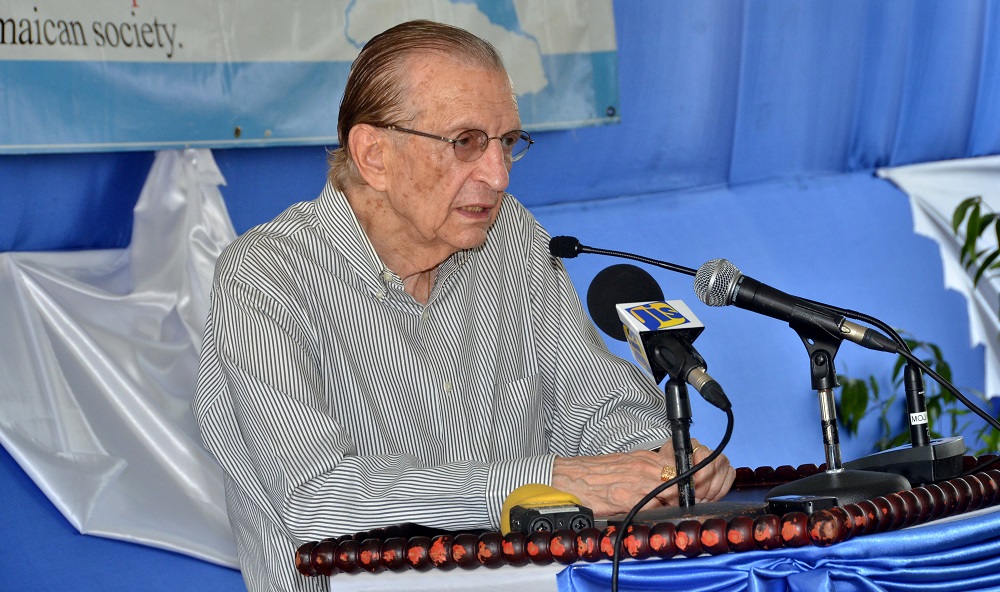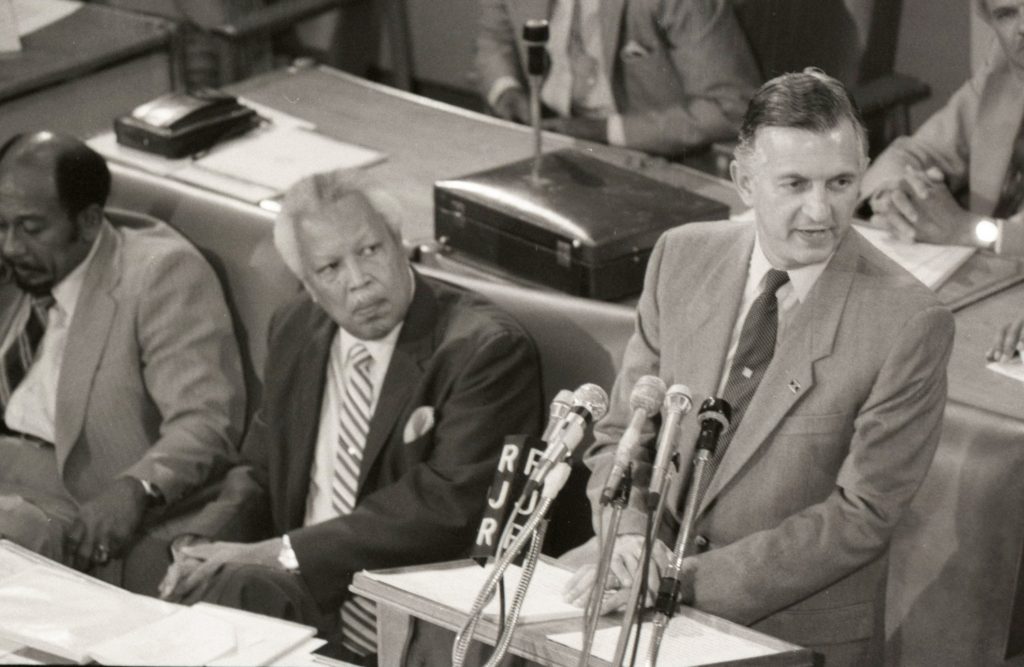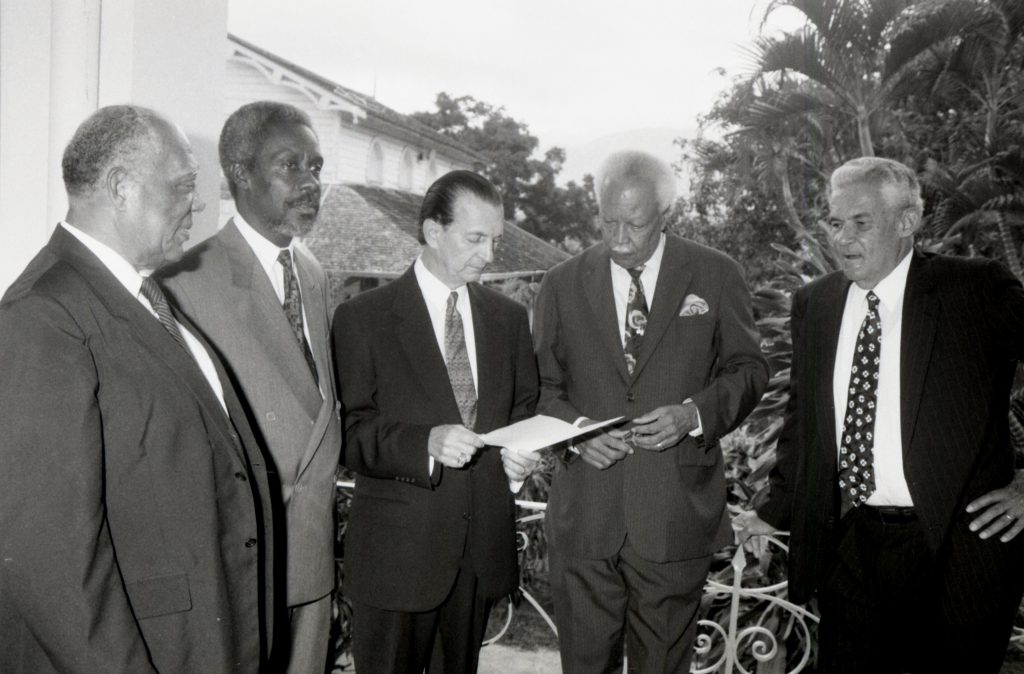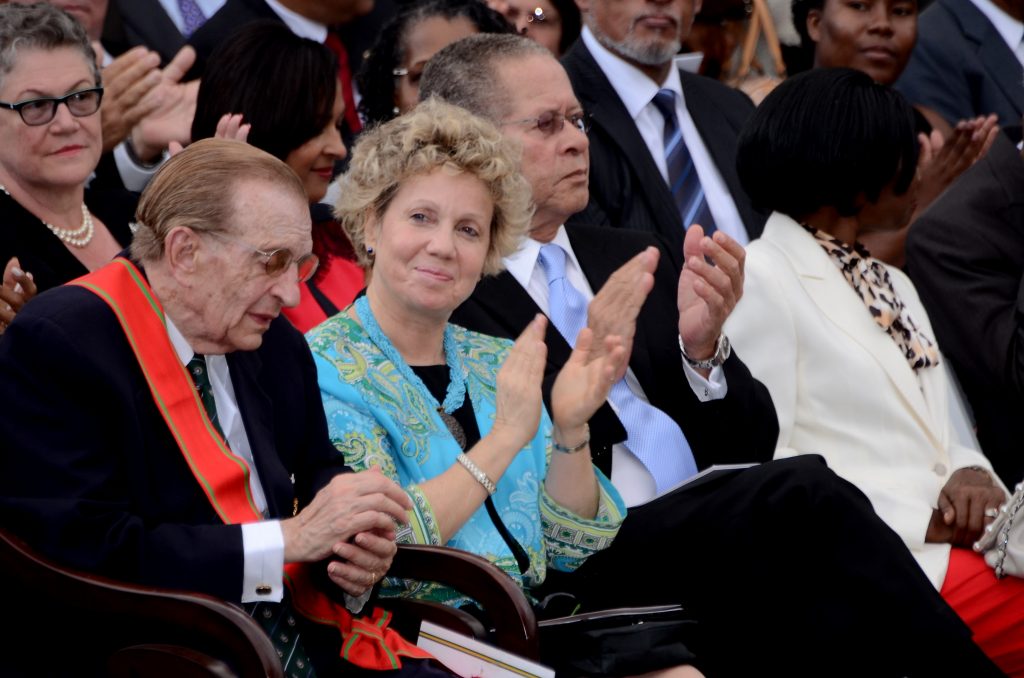Caribbean News
JAMAICA: Former Prime Minister Edward Seaga Passes
Published
7 years agoon

#Kingston, May 28, 2019 – Jamaica – Former Prime Minister, the Most Hon. Edward Seaga, died today (May 28), in the United States, where he was receiving treatment.

Mr. Seaga, aged 89, was Jamaica’s fifth Prime Minister, serving from October 1980 to February 1989.
Through 43 years of unwavering service to the nation, the former Prime Minister played a fundamental role in shaping Jamaica’s post-Independence parliamentary landscape.
Mr. Seaga was one of the founding fathers who framed the Jamaican Constitution in 1961. He initiated a rewrite of the Human Rights section of the Constitution to provide for a Charter of Fundamental Rights and Freedoms; and created the office of public defender. The former Prime Minister was also a member of the first Parliament of independent Jamaica.
Described as a prolific, transformational leader, he had the distinction of being the longest-serving Member of Parliament (MP) in the history of Jamaica and the Caribbean region. Mr. Seaga represented the constituency of West Kingston from 1962 until his retirement from active politics in 2005.
Mr. Seaga’s legacy in shaping the country’s political history began at age 29, when in 1959, founder of the Jamaica Labour Party (JLP), Sir Alexander Bustamante, nominated him to serve in the Upper House of Parliament – the Legislative Council (later the Senate). Mr. Seaga was the youngest member to be appointed to serve in this capacity.

After winning his seat as MP in 1962, Mr. Seaga was appointed to the Cabinet as Minister of Development and Welfare. Following the 1967 General Election, he was appointed Minister of Finance and Planning and in 1974 became the Leader of the Jamaica Labour Party (JLP), a capacity in which he served for 30 years.
Mr. Seaga became Prime Minister following the General Election of October 30, 1980. The JLP again took the helm of Government at the 1983 General Election and Mr. Seaga remained Prime Minister until February 1989. During the course of his political life, Mr. Seaga made a significant impact on Jamaica’s growth and development through the introduction of various programmes and the establishment of institutions across the social, cultural, political and financial sectors.
Starting from as early as 1961 with Things Jamaican, Mr. Seaga also established the Jamaica Festival Movement, and spearheaded the repatriation of Marcus Garvey and his appointment as the country’s first National Hero.
The former Prime Minister also created the training institution, HEART Trust/NTA; and established the Urban Development Corporation, Jamaica Stock Exchange and Jamaica Unit Trust. Also to his credit was the creation of the Jamaica Mortgage Bank; Students’ Loan Bureau; National Development Bank; Agricultural Credit Bank; Jamaica National Investment Promotion Ltd., now Jamaica Promotions Corporation (JAMPRO); and the EXIM Bank. His interventions to enhance the lives of the most vulnerable were perhaps the areas in which Mr. Seaga made the most resounding impact.
In the 1960s, Mr. Seaga transformed his West Kingston constituency, then known as ‘Back-O-Wall’ into a modern, low-income residential community. It was renamed Tivoli Gardens and remains a model of successful urban community development.

“The little things can give me as big a moment of joy as the big things. I like to do things that can help people to develop, because when you help people to develop, you are helping the country to develop,” Mr. Seaga told JIS News in 2016.
Mr. Seaga launched the Golden Age Movement in the 1960s, which was a new concept in modern community care for the aged, and the first Golden Age Home was built in 1985.
Also, the Food Aid Programme was established by Mr. Seaga in 1983 to assist the poorest groups in the society by supplementing their food supply. Further, in 1970, Mr. Seaga launched the Student Revolving Loan Fund to assist needy students at the university level.
In recognition of his contributions, Mr. Seaga received several prestigious awards at the local and international levels. Among them were the Order of the Nation in 2002, the second highest honour in Jamaica; several Doctor of Law (LLD) degrees from international universities between 1981 and 1987; the United Nations Environmental Leadership Award; Dr. Martin Luther King Humanitarian Award; and the Gleaner’s Man of the Year award for 1980 and 1981.
The North South Highway was also named in honour of Mr. Seaga in 2018.
When Mr. Seagaretired from representational politics, he accepted a post as Senior Research Fellow at the University of the West Indies (UWI) Mona campus, and was later named Chancellor at the University of Technology in 2010. He served as President of the Tivoli Gardens Football Club, and chaired the Premier League Clubs Association.
The former Prime Minister also had several publications, including ‘Grenada Intervention: The Inside Story’; ‘Revelations: Beyond Political Boundaries, Lectures 2005-2009’; ‘Parent-Teacher Relationships’, published by the Institute of Social and Economic Research, UWI; and ‘Revival Spirit Cults’ (Jamaica Journal), published by the Institute of Jamaica.
There are also two volumes of his autobiography, titled, Edward Seaga: My Life and Leadership: Clash of Ideologies, Volume 1; and Edward Seaga: Shaping History: Hard Road to Travel, Volume 2.

Mr. Seaga also did CD compilations of ‘Folk Music of Jamaica’ (album of music recorded by Ethnic Folkways Library), and ‘Origins of Jamaican Music: Reggae Golden Jubilee’, which was released in 2012. During his illustrious tenure, Mr. Seaga helped to shape many political minds, including Prime Minister, the Most Hon. Andrew Holness, upon whom he made a profound personal impact.
In a 2012 tribute to Mr. Seaga in Parliament when he was Leader of the Opposition, Mr. Holness referred to him as “one who mentored and, I dare say, fathered me politically”.
Mr. Holness, who said he had the privilege of working with Mr. Seaga during his early years in politics, said he was amazed by his capacity for work and his attention to detail.
Thanking him for dedicated and faithful service to Jamaica, Mr. Holness said that Mr. Seaga’s name is “indelibly etched on almost every facet of Jamaican life”.
By: Alecia Smith
Release: JIS
Photo Captions:
Header: The late former Prime Minister, the Most Hon. Edward Seaga, speaks at the opening of the Tivoli Gardens Restorative Justice Centre, in West Kingston, in 2017.
First Insert: The late former Prime Minister, the Most Hon. Edward Seaga, opens the 1983 Budget Debate in the House of Representatives. To his right is the late former Prime Minister, the Most Hon. Hugh Shearer.
Second Insert: The late former Prime Minister, the Most Hon. Edward Seaga (centre), peruses a programme at a ceremony at King’s House in 1992. Others (from left) are the late former Governor-General, His Excellency the Most Hon. Howard Cooke; former Prime Minister, the Most Hon. P. J. Patterson; the late former Prime Minister, the Most Hon. Hugh Shearer; and the late former Prime Minister, the Most Hon. Michael Manley.
Third Insert: The late former Prime Minister, the Most Hon. Edward Seaga (left), and Mrs. Carla Seaga, at a ceremony at King’s House in 2016.
JIS File Photos
You may like
Caribbean News
Seven Days. Seven Nations. One Storm — Hurricane Melissa
Published
3 months agoon
November 1, 2025
A week of wind, water, and heartbreak
From Haiti’s hillsides to Bermuda’s reefs, seven Caribbean nations have been battered, bruised, and forever marked by Hurricane Melissa — a storm that tested not only the region’s infrastructure but its unshakable spirit of unity.
Saturday–Sunday, October 25–26 – The First Strike: Hispaniola
Before the storm even earned its name, torrential rain and flash floods swept across Haiti and the Dominican Republic, claiming lives and tearing through rural communities.
tearing through rural communities.
In southern Haiti, rivers burst their banks, swallowing roads and homes; 23 people were confirmed dead by Sunday evening. Across the border, one death was reported in the Dominican Republic as swollen rivers cut off villages in Barahona and Pedernales.
By nightfall, the tropical system had strengthened — and the Caribbean knew it was facing something historic.
Monday, October 27 – Evacuations and Airlifts
In The Bahamas, Prime Minister Philip Davis issued a mandatory evacuation for the MICAL Islands — Mayaguana, Inagua, Crooked Island, Acklins, Long Cay, and Ragged Island.
Bahamasair added extra flights as the nation braced for what forecasters warned could become the strongest storm in nearly two decades.
Meanwhile, Jamaica, Turks & Caicos, and Cuba activated their national emergency operations centers.
Tuesday, October 28 – Jamaica and Haiti Hit Hard
By afternoon, Hurricane Melissa made landfall near St Elizabeth, Jamaica, as a Category 5 hurricane — winds of 185 mph, central pressure 892 mb, the lowest ever recorded so close to the island.
Roads collapsed, bridges washed away, and Black River Hospital lost its roof. Power failed for 72 percent of the island.
BOJ TV footage shows split asphalt, sparking lines, and flooded communities abandoned for safety.
Initially four were reported dead, that grew to seven deaths and heavy damage in 170 communities; Andrew Holness, Jamaican Prime Minister calling it “a national test of resilience.”
Haiti, still recovering from the weekend’s flooding, was hit again as outer bands dumped more rain on Les Cayes and Jacmel, deepening the humanitarian crisis.
Wednesday, October 29 – Crossing to Cuba
Weakened slightly to Category 4 (145 mph), Melissa tracked north-northeast at 8 mph, hammering eastern Cuba with hurricane-force winds
and mudslides. Over 15 000 people were evacuated from Santiago de Cuba and Holguín.
In Turks & Caicos, the Regiment deployed to Grand Turk, Salt Cay, South, North and Middle Caicos, preparing shelters and securing public buildings.
Thursday, October 30 – The Bahamas and the All Clear
Melissa’s speed increased, sparing the northern Caribbean its worst.
The Bahamas Airport Authority closed 13 airports from Mayaguana to Exuma International; none reported casualties, though infrastructure suffered.
In Turks & Caicos, the all-clear came early Thursday after minimal impact. Premier Washington Misick expressed gratitude and pledged support for neighbors:
“We must act — not only with words, but with compassion and deeds.”
Friday, October 31 – Counting the Cost
By Friday, Melissa had weakened to Category 3 (120 mph) north of Cuba.
The Bahamas Department of Meteorology issued its final alert, lifting warnings for the southern islands.
Regional toll:
- Haiti: 23 dead, thousands displaced.
- Jamaica: 7 dead, 170 communities damaged; 72% without electricity
- Cuba: 2 dead, 15, 000 evacuated.
- Dominican Republic: 1 dead, flooding in southwest.
- Bahamas: 0 dead, minor infrastructure damage and flooding in southeast.
- Turks & Caicos: minimal to no impact.
Relief and Reconnection
The Cayman Islands became the first government to touch down in Jamaica post-storm. Premier Juliana O’Connor-Connolly led a contingent bringing a plane-load of essentials and pledged US $1.2 million in aid.
Reggae icon Shaggy arrived on a private jet with friends, delivering food, medical kits, and hygiene supplies.
Meanwhile, Starlink and FLOW Jamaica activated emergency satellite internet across Jamaica providing free connectivity through November.
From overseas, U.S. President Donald Trump, speaking during his Asia tour, announced that American search-and-rescue teams and disaster aid will support the region.
“They can depend on U.S. assistance as they recover from this historic storm,” he said.
Faith, Funds, and False Websites
The Government of Jamaica and the Sandals Foundation have both launched verified donation portals for recovery. Officials are warning against fake crowdfunding pages posing as relief sites and urging donors to use only official channels.
A Seventh Nation in the Crosshairs – Bermuda
As Hurricane Melissa left the Caribbean basin, Bermuda found itself next in line.
Forecasts indicated the storm would pass just west of the island late Thursday into Friday, likely as a Category 1 to 2 hurricane with sustained winds near 105 mph.
Though far weaker than when it ravaged Jamaica, officials issued a hurricane warning, urging residents to secure property and expect tropical-storm conditions.
By all appearances Bermuda is heeding the warnings
The Human Response
Across the Caribbean, solidarity surged.
The Global Empowerment Mission (GEM) in Miami began airlifting relief supplies, while churches, civic groups, and businesses in The Bahamas and Turks & Caicos organized drives for displaced families.
“Your dedication gave our islands the strength to face the storm,” Premier Misick said. “Together, as one Caribbean family, we will rise stronger.”
Resilience in the Wake
Melissa’s winds may have faded, but her impact endures. Engineers are inspecting bridges, hillsides, and water systems; volunteers are clearing debris and distributing aid in communities still cut off.
From Haiti’s ravaged river valleys to Jamaica’s sugar towns, from Cuba’s eastern hills to The Bahamas’ salt ponds and Bermuda’s reefs, the region once again stands at the crossroads of ruin and renewal — and leans, as always, toward hope and a faithful God
Caribbean News
Haitian Pushback Halts Controversial Constitution Rewrite — What’s Next?
Published
3 months agoon
October 15, 2025
Deandrea Hamilton | Editor
Haitian media, legal scholars and civic voices did what bullets and barricades couldn’t: they stopped a sweeping constitutional overhaul widely branded as anti-democratic. Editorials and analyses tore into proposals to abolish the Senate, scrap the prime minister, shift to one-round presidential elections, expand presidential power, and open high office to dual-nationals—a package critics said would hard-wire dominance into the executive at a moment of near-lawless insecurity.
The Venice Commission—Europe’s top constitutional advisory body—didn’t mince words either. In a formal opinion requested by Haiti’s provisional electoral authorities, it pressed for clear legal safeguards and credible conditions before any referendum, including measures to prevent gang interference in the electoral process—an implicit rebuke of pushing a foundational rewrite amid a security collapse.
Facing that drumbeat, Haiti’s Transitional Presidential Council has now formally ended the constitutional-reform initiative. The decision, taken at a Council of Ministers meeting at the National Palace, effectively aborts the rewrite track that has haunted Haiti since the Moïse and Henry eras.
So what now? Per the Miami Herald, the pivot is back to basics: security first, elections next. That means stabilizing Port-au-Prince enough to run a vote, rebuilding the electoral timetable, and empowering the provisional electoral machinery—none of which is simple when gangs control vast chunks of the capital and state authority remains fragile. Recent headlines underline the risk: gunfire has disrupted top-level government meetings, a visceral reminder that constitutional theory means little without territorial control.
Bottom line: Haitian journalists and public intellectuals helped slam the brakes on a high-stakes centralization of power that lacked legitimacy and safe conditions. International constitutional experts added weight, and the transition authorities finally conceded reality. Now the fight shifts to making an election possible—clean rolls, secure polling, and credible oversight—under circumstances that are still hostile to democracy. If the state can’t guarantee basic safety, any ballot is theater. If it can, shelving the rewrite may prove the first real step back toward consent of the governed.
Caribbean News
Political Theatre? Caribbean Parliamentarians Walk Out on House Speaker
Published
3 months agoon
October 14, 2025
By Deandrea Hamilton | Magnetic Media
October 14, 2025 – It’s being called political theatre — but for citizens, constitutional watchdogs, and democracy advocates across the Caribbean, it feels far more serious. Within a single week, two national parliaments — in Trinidad and Tobago and St. Kitts and Nevis — descended into turmoil as opposition members stormed out in protest, accusing their Speakers of bias, overreach, and abuse of parliamentary procedure.
For observers, the walkouts signal a deeper problem: erosion of trust in the very institutions meant to safeguard democracy. When Speakers are viewed as political enforcers instead of neutral referees, parliaments stop functioning as chambers of debate and start performing as stages for power and spectacle — with citizens left wondering who, if anyone, is still accountable.
October 6: St. Kitts Parliament Erupts
The first walkout erupted in Basseterre on October 6, 2025, when Dr. Timothy Harris, former Prime Minister and now Opposition Leader, led his team out of the St. Kitts and Nevis National Assembly in a protest that stunned the chamber.
led his team out of the St. Kitts and Nevis National Assembly in a protest that stunned the chamber.
The flashpoint came as the Speaker moved to approve more than three years’ worth of unratified parliamentary minutes in one sitting — covering 27 meetings and three national budgets — without individual review or debate.
Dr. Harris called the move “a flagrant breach of the Constitution and parliamentary tradition,” warning that the practice undermines transparency and accountability. “No serious parliament can go years without approving a single set of minutes,” he said after exiting the chamber.
The Speaker defended the decision as administrative housekeeping, but critics were unconvinced, branding the move a “world record disgrace.” The opposition’s walkout triggered renewed calls for the Speaker’s resignation and sparked a wider public discussion about record-keeping, accountability, and respect for parliamentary norms in St. Kitts and Nevis.
October 10: Trinidad Opposition Follows Suit
Four days later, on October 10, 2025, the Opposition United National Congress (UNC) in Trinidad and Tobago staged its own walkout from the House of Representatives in Port of Spain.
The UNC accused the Speaker of partisan bias, claiming she had repeatedly blocked urgent questions, ignored points of order, and allowed government members to breach standing orders without consequence.
“The Speaker has failed in her duty to act impartially,” the Opposition declared in a statement. “Parliament is not the property of any political party or Presiding Officer.”
The dramatic exit was seen as a culmination of months of rising tension and frustration, with opposition MPs arguing that parliamentary rules were being selectively applied to silence dissenting voices.
Political analyst Dr. Marcia Ferdinand described the twin walkouts as “a warning sign that parliamentary democracy in the Caribbean is teetering on the edge of performative politics.”
“When chairs become political shields rather than constitutional referees,” she said, “democracy becomes theatre, not governance.”
A Pattern Emerging
While St. Kitts and Trinidad are very different political environments, both incidents point to the same regional fault line: the perception that Speakers — the guardians of parliamentary order — are no longer impartial.
In Westminster-style systems like those across the Caribbean, the Speaker’s authority depends not on power but on public confidence in fairness. Once that credibility erodes, parliamentary control collapses into confrontation.
Governance experts say the implications are serious: eroded trust between government and opposition, declining public confidence in state institutions, and growing voter cynicism that “rules” are flexible tools of political advantage.
Why It Matters
Parliamentary walkouts are not new in the Caribbean, but what makes these recent events different is their frequency and intensity — and the regional echo they’ve created. Social media has amplified images of lawmakers storming out, with citizens from Barbados to Belize questioning whether the same erosion of decorum could be happening in their own legislatures.
the regional echo they’ve created. Social media has amplified images of lawmakers storming out, with citizens from Barbados to Belize questioning whether the same erosion of decorum could be happening in their own legislatures.
Analysts warn that if this perception takes hold, it risks diminishing the moral authority of parliamentary democracy itself.
“Once opposition MPs believe the rules are rigged, and once citizens believe Parliament is just performance,” said one Caribbean governance researcher, “you’ve lost the most valuable currency in democracy — trust.”
Restoring Balance
Political reformers across the region are calling for tighter Standing Order enforcement, independent parliamentary service commissions, and training to strengthen Speaker neutrality. Civil society leaders say the public must also play its part by demanding transparency and refusing to normalize partisan manipulation of parliamentary procedure.
Whether these twin walkouts become catalysts for reform — or simply another episode of Caribbean political theatre — will depend on what happens next inside those chambers.
For now, democracy watchers agree on one thing: when opposition leaders feel the only way to be heard is to walk out, the entire democratic house — not just its Speaker — is in danger of collapse.
Angle by Deandrea Hamilton. Built with ChatGPT (AI). Magnetic Media — CAPTURING LIFE.








